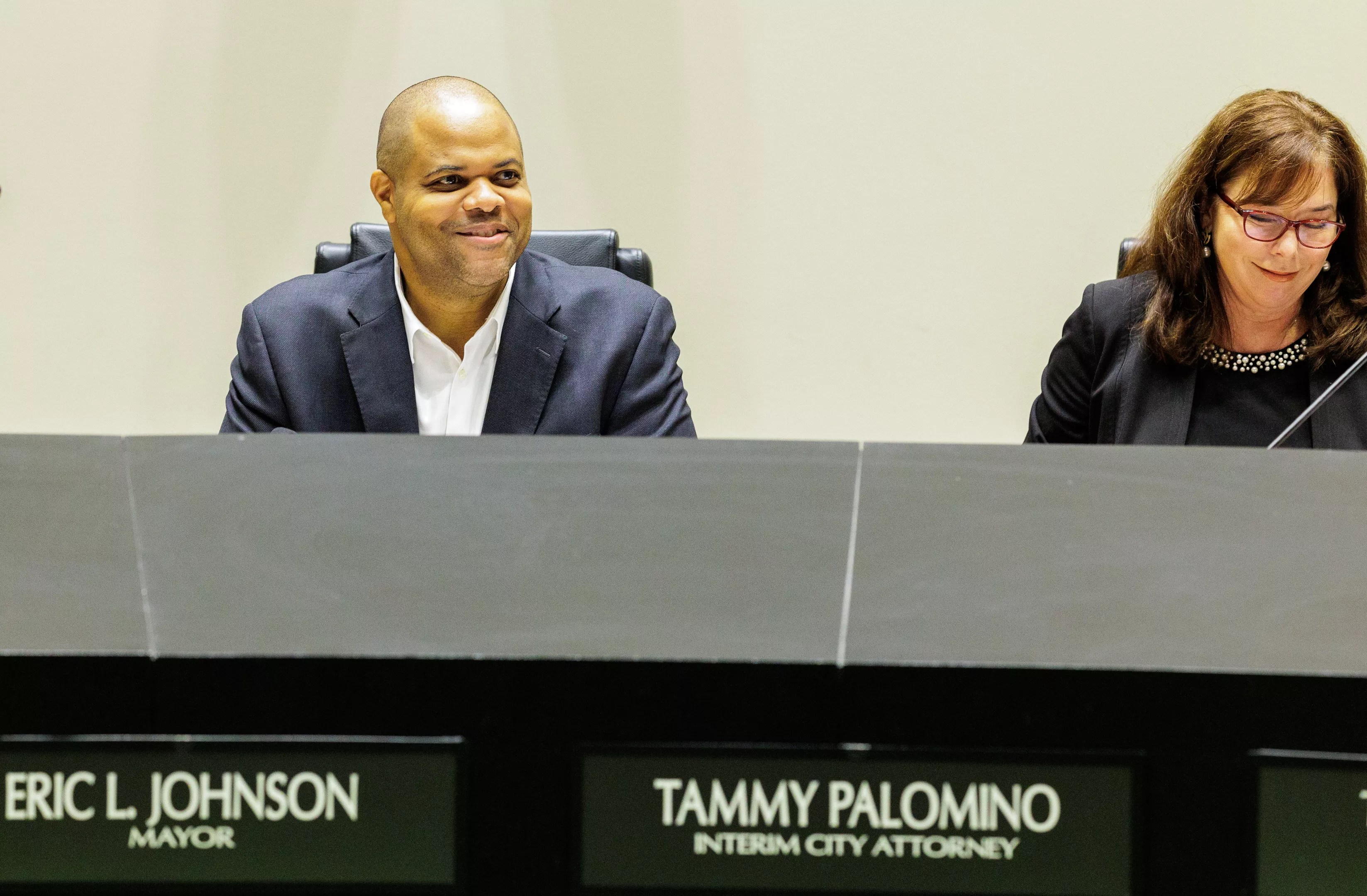
Nathan Hunsinger

Audio By Carbonatix
Dallas Mayor Eric Johnson stood before the horseshoe Thursday morning and delivered his sixth annual State of the City address, a speech mandated by the Dallas City Charter to address the state of Dallas’ financial condition, accomplishments and plans for the future.
The mayor touched on many of his routine talking points: public safety, Dallas’ investment in professional sports and the millions of dollars being poured into the city’s park system. Dallas, Johnson has long maintained, is and should remain a land of opportunity for all residents.
But he broke from his usual tenor on several occasions: while discussing public safety, Johnson acknowledged Darron Burkes, the Dallas Police Officer who was shot and killed in Oak Cliff over the summer, as a hero.
“I pray that the city of Dallas never forgets his sacrifice or his name,” Johnson said in a somber moment.
At the end of Johnson’s brief address, we left with three main takeaways about the mayor’s vision for Dallas next year.
1. The 4 Ps Aren’t Going Anywhere
In many ways, Johnson’s 2024 address mirrored the speeches made in 2023 and 2022. For the last three years, the mayor has reiterated his concerns for the four Ps – public safety, parks, potholes and property taxes – to the extent that the 2024 and 2023 State of the City addresses are almost identical when put side by side. (Johnson referred to the Three Ps – public safety, parks and potholes – in his 2022 address, although he did acknowledge property taxes later on in the speech.)
“These four pillars are essential to Dallas remaining a city of opportunity for everyone,” Johnson said.
If the 2022 address introduced the Ps to Dallas, the 2023 address was an opportunity to lobby for them ahead of major city elections like the bond and Dallas City Charter. To that extent, this year’s address was a victory lap for Johnson.
A $1.25 billion bond “overwhelmingly approved” by voters this year provides record amounts of funding for parks, and the Halperin Deck park over Interstate 35 was granted the largest private donation in Dallas’ history. Johnson has upheld the city’s parks as the great equalizer across Dallas’ demographics, and the advancements to our parks during his administration have been an undisputed success, evidence that “the state of our city is stronger than ever.”
It is repetitive, though, to hear the mayor harping on the same four P-lettered talking points year after year; one starts to wonder, as we cheer for the successes of the year past, what road is Dallas on for the future?
2. Public Safety Is Johnson’s Biggest Priority
In a rare glimpse of Johnson’s plans for Dallas next year, he announced that he will release Dallas’ “first-ever comprehensive public safety policy” in the coming months. He provided no details of what this would look like, but the endeavor will be headed by city council member Cara Mendelsohn, who chairs the Public Safety Committee, and by the next police chief.
“In order to be a city of genuine opportunity, Dallas must be safe first and foremost,” he said.
The comprehensive plan is intended to guide the “next decade” of Dallas’ approach to safety and policing, he added.
Investments in a new Dallas Police training center are “emblematic” of Dallas’ support for the police department, and the city council’s recent approval of a 30-year pension funding plan for retired police and fire personnel reinforces the city’s dedication to first responders, he said. Johnson also pointed to public safety data showing Dallas’ violent crime rate has fallen from last year as evidence that the city is on the right track.
While Johnson credited the city’s Violent Crime Reduction Plan with decreasing crime for the last four years, it is unclear how the resignation of Dallas Police Chief Eddie Garcia – a major champion of the plan – will impact future public safety efforts.
Dallas’ next police chief will be hired by the next city manager, making it of the “utmost importance” to hire a city manager who prioritizes public safety as much as he does, Johnson said.
3. City Hall Needs To “Hear” Voters on Charter Amendments
Aside from an op-ed published in the Dallas Morning News, Johnson has largely steered away from conversations involving several controversial city charter amendments – two of which were approved by voters in November – that critics warn will fundamentally alter the city’s operations. Johnson was one of the few elected officials past or present who was not involved in the public campaign against the propositions.
(Johnson did not acknowledge the other community-led charter amendment that passed with an even more resounding approval rating than amendments S and U: the one that decriminalizes marijuana possession up to 4 ounces.)
On Thursday morning, the mayor remarked that the passage of propositions S and U sent a “resounding message to City Hall.”
“Our residents told us loud and clear that they want more police officers on our streets and a city government that is more accountable, more responsive and more transparent,” Johnson said. “These calls from our residents … could not be more clear, and City Hall must listen.”